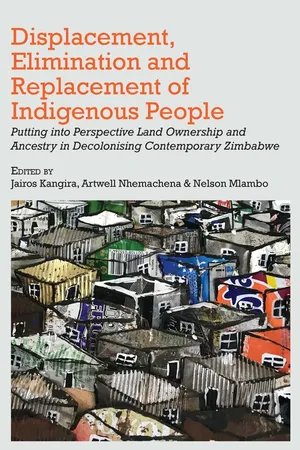
Displacement, Elimination and Replacement of Indigenous People
Putting into Perspective Land Ownership and Ancestry in Decolonising Contemporary Zimbabwe
- 280 pages
- English
- PDF
- Available on iOS & Android
Displacement, Elimination and Replacement of Indigenous People
Putting into Perspective Land Ownership and Ancestry in Decolonising Contemporary Zimbabwe
About This Book
Colonial scholars have taken immense pleasure in portraying Africans as possessed by spirits but as lacking possession and ownership of their resources, including land. Erroneously deemed to be thoroughly spiritually possessed but lacking senses of material possession and ownership of resources, Africans have been consistently dispossessed and displaced from the era of enslavement, through colonialism, to the neocolonial era. Delving into the historiography of dispossession and displacement on the continent of Africa, and in particular in Zimbabwe, this book also tackles contemporary forms of dispossession and displacement manifesting in the ongoing transnational corporations land grabs in Africa, wherein African peasants continue to be dispossessed and displaced. Focusing on the topical issues around dispossession and repossession of land, and the attendant displacements in contemporary Zimbabwe, the book theorises displacements from a decolonial Pan-Africanist perspective and it also unpacks various forms of displacements corporeal, noncorporeal, cognitive, spiritual, genealogical and linguistic displacements, among others. The book is an excellent read for scholars from a variety of disciplines such as Geography, Sociology, Social Anthropology, History, Linguistics, Development Studies, Science and technology Studies, Jurisprudence and Social Theory, Law and Philosophy. The book also offers intellectual grit for policy makers and implementers, civil society organisations including activists as well as thinkers interested in decolonisation and transformation.
Frequently asked questions
Information
Table of contents
- Cover
- Title page
- Copyright page
- About the Contributors
- Contents
- Chapter One - Theorising Displacement, Elimination and Replacement: An Introduction to Decolonising Land Issues
- Chapter Two - Land Dispossession and the Genesis of Crises in Zimbabwe: Implications for Sustainable Livelihoods and People-centred Development as Depicted in Selected Zimbabwean Fictional Narratives
- Chapter Three - ‘Mapfupa angu achamuka ’ (My bones will rise again): Spirituality, History, Memory and Ancestry in Land Ownership ‘Debates’ in Zimbabwe
- Chapter Four - Pegging Out Claims in Space and Place: The Theme of Land Redistribution in the Music of Simon Chimbetu
- Chapter Five - Of Mothers, Umbilical Cords and Tongues: Land Ownership, Language and Identity in Chirikure Chirikure’s Rukuvhute
- Chapter Six - Discourses of Colonial Displacement: The Impetus of Selected Historical Novels
- Chapter Seven - Spatial Marginalisation: (Re)reading Musaemura Zimunya’s Gendered Space and Place in Country Dawns and City Lights
- Chapter Eight - The San People of Zimbabwe: Decades after Land Dispossession
- Chapter Nine - Interrogation of the Nexus between Land Restitution and Poverty Alleviation in Contemporary Zimbabwe
- Chapter Ten - The Gendered Dispossession of Land in Colonial Rhodesia: An Analysis of Thomson Kumbirai Tsodzo’s Pafunge and Patrick Chakaipa’s Dzasukwa Mwana-Asina-Hembe
- Chapter Eleven - Fictionalising Resistance to Land Repossession: Political Economies of Displacement and the Imagination of a Better Zimbabwe
- Back cover